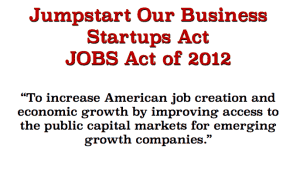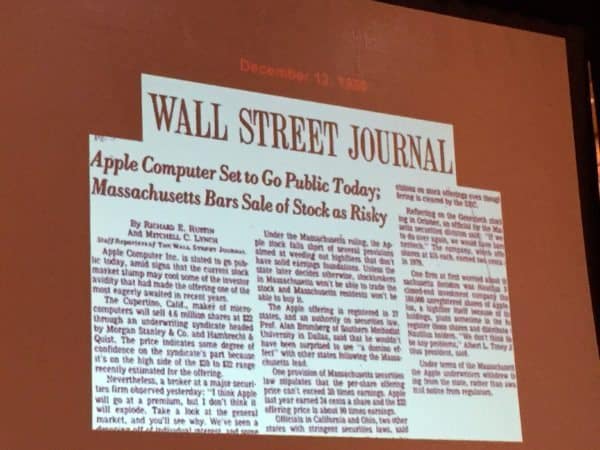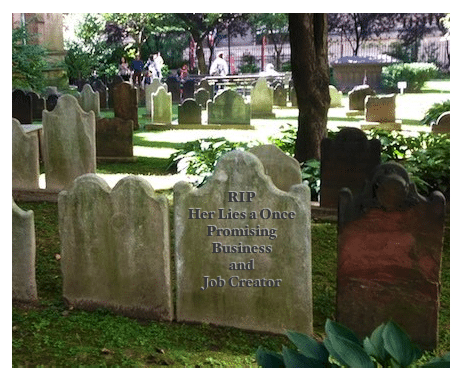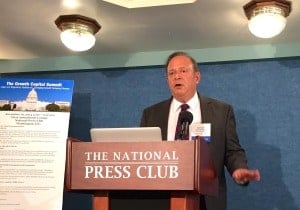On the eve of the 2015 Memorial Day weekend, Massachusetts Secretary of State William Galvin set the stage for what I expect will be the final chapter in the continuing saga of what has popularly been referred to as Regulation A+, a newly created avenue of capital formation for small and emerging businesses created by the JOBS Act of 2012. In a two page Petition for Review filed by Mr. Galvin against the SEC in the D.C. Court of Appeals on May 22, he is asking the court to undo regulations issued unanimously by the Commissioners of the SEC on March 25, 2015, currently scheduled to go into effect on June 19, 2015. Though Galvin’s detailed brief is not due to be filed with the court until June 22,  what is undoubtedly at the core of this dispute is the authority of the SEC under the JOBS Act to pre-empt the power of the 50 states to review public offerings, up to $50 million, under a new streamlined SEC registration procedure intended to allow smaller companies to go public, and remain public, at a fraction of the cost of a traditional IPO.
what is undoubtedly at the core of this dispute is the authority of the SEC under the JOBS Act to pre-empt the power of the 50 states to review public offerings, up to $50 million, under a new streamlined SEC registration procedure intended to allow smaller companies to go public, and remain public, at a fraction of the cost of a traditional IPO.
You see, according to Massachusetts’ ranking securities regulator, undoubtedly a stalking horse for the North American Securities Administrators Association (NASAA), it is not sufficient for the SEC’s highly trained staff to review the disclosures in a Regulation A+ offering. NASAA insists it can do a better job, both in ferreting out risky companies and protecting their constituents from financial ruin – especially with the authority to conduct “merit” reviews, in order to protect investors from companies and their offerings which they deem unfair, unjust or inequitable.
 This is the same William Galvin, who on December 18, 2013, the very day that the SEC issued proposed Regulation A+ rules for public comment, filed a scathing comment letter with the SEC, railing against the authority of the SEC to pre-empt the power of the states to review this new class of “mini-IPO” offerings. And this is the same Commonwealth of Massachusetts that barred retail investors from purchasing shares of Apple Computer when it debuted its IPO in 1980. – The reason? In the judgment of Massachusetts’ Securities Administrator, the offering was overvalued, and therefore simply too risky for the ordinary investor.
This is the same William Galvin, who on December 18, 2013, the very day that the SEC issued proposed Regulation A+ rules for public comment, filed a scathing comment letter with the SEC, railing against the authority of the SEC to pre-empt the power of the states to review this new class of “mini-IPO” offerings. And this is the same Commonwealth of Massachusetts that barred retail investors from purchasing shares of Apple Computer when it debuted its IPO in 1980. – The reason? In the judgment of Massachusetts’ Securities Administrator, the offering was overvalued, and therefore simply too risky for the ordinary investor.
So what does this mean for companies gearing up for a Regulation A+ offering?
At the moment, the best case is that an issuer who shows up at the SEC filing window on June 19 or thereafter will be left with the gnawing question – will its offering somehow be deemed illegal by the D.C. Court of Appeals at some indeterminate time in the future? But that calculus may quickly change, as news of this last ditch foray quickly finds its way over to Capitol Hill. As I noted in an article published back in April 2014:
“If NASAA pulls the trigger by initiating rule blocking litigation, it will likely not survive the recoil. And if the SEC becomes “gun shy” – it will only be a matter of time before the Capitol Hill cavalry arrives – asking what was wrong with the SEC’s elegantly crafted and balanced solution to serving both investors and capital formation, with carefully constructed investor protection measures.”
 No sooner was the ink dry on my April 2014 article, that Congressman Patrick McHenry introduced a bill into the House Financial Services Committee last May which would have settled the score on whether the SEC had the power under the JOBS Act to pre-empt state review authority – even taking things a few steps further than the SEC did, by also removing all state review authority for smaller Regulation A offerings, something left untouched by the JOBS Act. The McHenry bill was voted out of the House Capital Markets Subcommittee, but languished with the many other bills in Congress that were stymied by the then Democratically controlled Senate.
No sooner was the ink dry on my April 2014 article, that Congressman Patrick McHenry introduced a bill into the House Financial Services Committee last May which would have settled the score on whether the SEC had the power under the JOBS Act to pre-empt state review authority – even taking things a few steps further than the SEC did, by also removing all state review authority for smaller Regulation A offerings, something left untouched by the JOBS Act. The McHenry bill was voted out of the House Capital Markets Subcommittee, but languished with the many other bills in Congress that were stymied by the then Democratically controlled Senate.
Well, what a difference a year makes, with Congress now controlled by the Republicans and 2016 elections looming in the not too distant future. And how about all of the jobs that could be created with the proceeds of what are estimated to be hundreds of Regulation A+ offerings expected to be filed in the next 12 months alone – now effectively on hold – courtesy of state regulators clinging to their dwindling authority to review offerings cleared by the Staff of the SEC – and their jobs.
Having mourned the loss of American lives and limbs over Memorial Day weekend, expect Capitol Hill’s attention to quickly shift to another war, likely to be led by now House Deputy Whip and Vice Chair of the House Financial Services Committee, Patrick McHenry.
So how will all this play out in Washington, D.C. and around the 50 states?
I placed my bet over one year ago – not only on the outcome of landmark federal legislation intended to free up capital for small and emerging companies – but on the future of American job creators – and our nation.
 Though the smoke is rising from the bombshell dropped on American entrepreneurs, courtesy of Mr. Galvin, the view still looks the same to me as it did a year ago, when I remarked:
Though the smoke is rising from the bombshell dropped on American entrepreneurs, courtesy of Mr. Galvin, the view still looks the same to me as it did a year ago, when I remarked:
“In this game of high stakes poker between the SEC and NASAA, NASAA can ill afford to be, “all in.” Any litigation which NASAA might institute to block state preemption would likely prove to be a sucker’s bet –garnering ill will in Congress – and, sooner or later, inevitable legislative backlash. After all, small businesses and IPO’s are major job creators. Jobs and the economy are kitchen table issues which drive voters – not so, investor protection concerns. And job creation (or the lack thereof) cuts across broad voter demographics.”
It’s time for Congress to finish the job it started back in 2012, when the JOBS Act became the law of the land – before the summer Congressional recess.
[scribd id=266635580 key=key-d0EH3iy0FigG6LmRqiQZ mode=scroll]
 Samuel S. Guzik, a Senior Contributor to Crowdfund Insider, is a corporate and securities attorney and business advisor with the law firm of Guzik & Associates, with more than 30 years of experience in private practice. Guzik is also the President and Board Chair of the Crowdfunding Professional Association. A nationally recognized authority on the JOBS Act, including Regulation D private placements, investment crowdfunding and Regulation A+, he is and an advisor to legislators, researchers and private businesses, including crowdfunding issuers, service providers and platforms, on matters relating to the JOBS Act. As an advocate for small and medium sized business he has engaged with major stakeholders in the ongoing post-JOBS Act reform, including legislators, industry advocates and federal and state securities regulators. In 2014, some of his speaking engagements have included leading a Crowdfunding Roundtable in Washington, DC sponsored by the U.S. Small Business Administration Office of Advocacy, a panelist at the MIT Sloan School of Business 2014 Crowdfunding Roundtable, and a panelist at a national bar association event which included private practitioners, investor advocates and officials of NASAA. His articles on JOBS Act issues, including two published in the Harvard Law School Forum on Corporate Governance and Financial Regulation, have also served as a basis for post-JOBS Act proposed legislation. Recently he was cited by SEC Commissioner Daniel M. Gallagher in a public address for his advocacy on SEC regulatory reform for small business. He is admitted to practice before the SEC and in New York and California. Guzik has represented a number of public and privately held businesses, from startup to exit, concentrating in financing startups and emerging growth companies. He also frequent blogger on securities and corporate law issues at The Corporate Securities Lawyer Blog.
Samuel S. Guzik, a Senior Contributor to Crowdfund Insider, is a corporate and securities attorney and business advisor with the law firm of Guzik & Associates, with more than 30 years of experience in private practice. Guzik is also the President and Board Chair of the Crowdfunding Professional Association. A nationally recognized authority on the JOBS Act, including Regulation D private placements, investment crowdfunding and Regulation A+, he is and an advisor to legislators, researchers and private businesses, including crowdfunding issuers, service providers and platforms, on matters relating to the JOBS Act. As an advocate for small and medium sized business he has engaged with major stakeholders in the ongoing post-JOBS Act reform, including legislators, industry advocates and federal and state securities regulators. In 2014, some of his speaking engagements have included leading a Crowdfunding Roundtable in Washington, DC sponsored by the U.S. Small Business Administration Office of Advocacy, a panelist at the MIT Sloan School of Business 2014 Crowdfunding Roundtable, and a panelist at a national bar association event which included private practitioners, investor advocates and officials of NASAA. His articles on JOBS Act issues, including two published in the Harvard Law School Forum on Corporate Governance and Financial Regulation, have also served as a basis for post-JOBS Act proposed legislation. Recently he was cited by SEC Commissioner Daniel M. Gallagher in a public address for his advocacy on SEC regulatory reform for small business. He is admitted to practice before the SEC and in New York and California. Guzik has represented a number of public and privately held businesses, from startup to exit, concentrating in financing startups and emerging growth companies. He also frequent blogger on securities and corporate law issues at The Corporate Securities Lawyer Blog.


